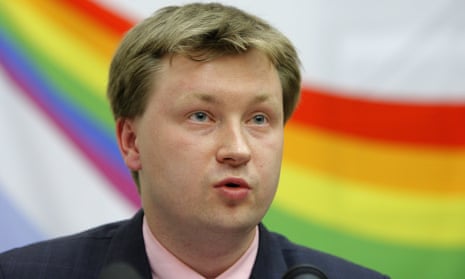A Russian law that bans gay “propaganda” encourages homophobia and discrimination, the European court of human rights has ruled, in a sharply worded rebuke to the Kremlin.
Three Russian gay rights activists brought the case against the 2013 federal statute, widely known as the “gay propaganda” law, after they were arrested between 2009-12 for protesting against local anti-gay laws, which became the model for the later national law.
“By adopting such laws the [Russian] authorities reinforce stigma and encourage homophobia, which is incompatible with the notions of equality, pluralism and tolerance inherent in a democratic society,” the Strasbourg-based ECHR said in a comprehensive demolition of the arguments advanced by Russian lawyers.
The Russian law bans giving children any information about homosexuality and is widely thought to have made life harder for gay Russians, who were already battling deep social prejudices. The Disney film Beauty and the Beast fell foul of the law, when a ruling party MP called for the musical to be banned.
One of the activists who brought the case was arrested after he had stood in front of a secondary school in Ryazan with placards stating “homosexuality is normal” and “I am proud of my homosexuality”.
The second and third applicants had picketed a public library in Arkhangelsk with banners listing famous Russians believed to have been gay. One of the banners said: “Children have the right to know. Great people are also sometimes gay; gay people also become great. Homosexuality is natural and normal.” One of the men carried out another protest at an administrative building in St Petersburg.
The three men had been fined for breaking the law and appealed to the ECHR in Strasbourg after Russia’s constitutional court dismissed their cases. In a long-awaited ruling the ECHR took apart the arguments put forward by Russian government lawyers, rejecting claims the law protected public morals, health and other people’s rights.
The court ruled such measures were “likely to be counterproductive in achieving the declared legitimate aims of protection of health and the protection of the rights of others,” while saying the vague wording opened the door to abuse.
It concluded that Russia had violated the European convention on human rights on freedom of expression (article 10) and prohibition of discrimination (article 14). The state has been ordered to pay damages totalling €43,000 (£37,800) plus costs and interest within three months.
The judgment was the majority opinion of six out of seven of the judges, only Russian judge Dmitry Dedov offered a dissenting opinion.
A spokesman for Vladimir Putin said the Kremlin would study the ruling, local media reported. Between 2014-16, 14 people were fined under this law, according to independent website Meduza.
Nikolai Alexeyev, a Russian gay rights activist, described the ruling as “an enormous court victory for LGBT people in Russia”.
“We have managed to legally prove that by adopting those laws Russian authorities breached their international commitments under the European convention,” he said.
Homosexuality was decriminalised in Russia in 1993, but prejudice has remained widespread. Russia’s anti-gay laws are thought to have contributed to a surge in vigilantism across the country, with gay people lured to meetings before being beaten and humiliated, often on camera.
An anti-gay campaign in the southern republic of Chechnya organised by security services has led to at least 100 men being rounded up and imprisoned. Many are known to have been tortured and some are believed to have been killed. Russian officials said in May they were investigating the reports.
Russia joined the Council of Europe in 1996, bringing it under the jurisdiction of the human rights court.
The Russian government had defended its law, arguing that many citizens disapprove of homosexuality, but the court rejected this reasoning, noting that minority rights become “theoretical” when they are conditional on being accepted by the majority.
On Tuesday, foreign minister Sergei Lavrov dismissed criticisms over Russia’s treatment of gay people.
“On LGBT, we do not prosecute for this or that orientation,” he told reporters in Moscow.







